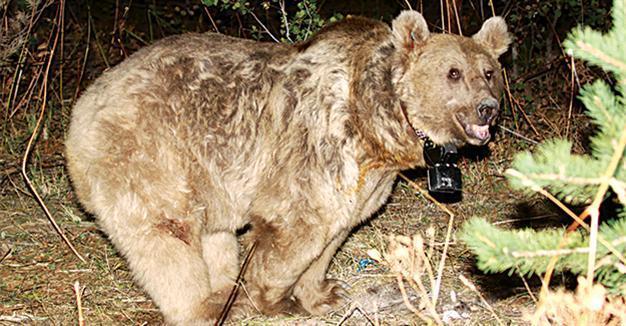World’s first migrant bears in Turkey’s Sarıkamış
KARS – Doğan News Agency

AA photo
A project on the examination and protection of Anatolian wildlife and carried out under the leadership of the Kars Northern Nature Association Director Çağan Şekercioğlu has yielded very significant results.
Şekercioğlu and his team, working with permission from the Ministry of Forestry and Water Affairs Directorate of Nature Conservation and National Parks, have found that brown bears living in the eastern province of Kars’ Sarıkamış district are the first migrant bears in the world.
Utah and Koç University academic Şekercioğlu said that together with the Zurich, Kafkas, Zagreb and Bosphorus University teams, they followed brown bears with satellite transmitters and found that they migrated to Artvin’s Şavşat district from Sarıkamış in the spring.
He said the bears fed on fruits and acorns in Şavşat’s productive forests to store fat before returning to Sarıkamış to go into hibernation. The bears’ overall migration route covers 250 kilometers.
No other bears in literature
Şekercioğlu said no other bear migration had ever been observed anywhere in the world.
“Some of the bears we observed do not migrate anymore and feed on the food in the Sarıkamış garbage dump. This migration shows us that the Sarıkamış forests do not have enough space and food resources for brown bears. Most traveling brown bears walk for 1,600 kilometers per year. But in this 328-square kilometer forest, more than 50 brown bears live together,” he added.
“The plant coverage is weak here. Locals collect plants for their food and animals. Cattle also gather in the forest and destroy this plant cover. In the beginning of spring, brown bears migrate to the rainy forests of Şavşat and the Kaçkar Mountains. They eat the plant coverage there, especially the acorns, and return to Sarıkamış for hibernation. This migration covers around 250 kilometers. But we saw that more than half of the bears don’t migrate anymore because of the Sarıkamış garbage dump. They find most of their food there,” Şekercioğlu said.
Planting works
Stating that the forests’ plant coverage should be increased and diversified, Şekercioğlu said the ministry would realize the idea to open Turkey’s first wildlife corridor, which he had first proposed in 2008.
The General Directorate of Combating Desertification and Erosion and the Directorate of Nature Conservation and National Parks has taken action to this end, he added.
“A field of 162-square kilometers on the migration route of the bears will be reforested. In this way, a new 28,000-hectare protection forest will be developed. Millions of trees will be planted. Brown bears will be able to migrate from Sarıkamış to the Georgian border without leaving the forest and then return to Sarıkamış again,” Şekercioğlu said.
Reforestation has started in Ardahan and Artvin but no action has been taken in Kars and Ardahan for four years.
“This is why it is of vital importance for brown bears for Turkey’s first wildlife corridor to be developed as soon as possible, for the start of reforestation in Kars and Ardahan,” Şekercioğlu said.
“We have examined the literature and could not find any bear population in the world that migrates. These are the first known migrant bears in the world and they are in Turkey. We are very pleased that we have published an academic article in British Journal of Zoology. We made this important research with Gabrielle Cozzi and Arpat Özgül of Zurich University, my doctorate student Mark Chynoweth from the University of Utah, Josip Kusak of Zagreb University, Emrah Çoban from the Kars Northern Nature Association, and Ayşegül Çoban from Kafkas University,” he added.
